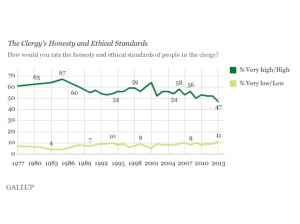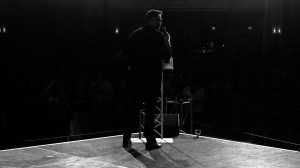In this series

Once again, Gallup has examined who Americans regard as the most honest and ethical person in their lives—and found that the answer is not their pastor, but their nurse or pharmacist.
In fact, recorded public trust in clergy has now reached an all-time low, with only 47 percent of Americans rating clergy highly on honesty and ethics (compared to 82 percent saying the same about nurses). The previous low since Gallup began asking the question in 1977: 50 percent in 2009.
However, clergy still ranked No. 7 out of the 22 professions studied. And confidence in the overall church as an institution improved over the past year.
CT reported the results of last year's survey, when 52 percent rated clergy highly on honesty and ethics. This still placed clergy within the top half of all rated professions in 2012 (No. 8 out of 22). Confidence in clergy has stayed relatively stable over time: ranging from 61 percent in 1977 to a high of 67 percent in 1985, but has been consistently in the low 50s in recent years.
In 2013, Americans rated six professions more trustworthy than clergy: nurses, pharmacists, grade school teachers, medical doctors, military officers, and police officers. Meanwhile, engineers, dentists, and college teachers—three professions which surpassed clergy in 2012—dropped below clergy in 2013. (Grade school teachers and military officers rose above clergy from 2012 to 2013, while nurses, pharmacists, medical doctors, and police officers topped clergy in both years.)
However, clergy members were nowhere near the low rating of members of Congress, with only eight percent of Americans vouching for lawmakers' trustworthiness. Congress ranked second to last behind lobbyists (6%), while car salespeople ranked ahead of both groups (9%).
Gallup notes:
If views of a certain profession have changed, it usually has been a function of scandal surrounding it. The Catholic priest abuse stories from the early 2000s helped lead to a sharp drop in Americans' ratings of clergy, a decline from which the profession has yet to fully recover.
Americans are divided along party lines, as well as age. Gallup found more trust in clergy among Republicans (63%) than Democrats (40%). Similarly, clergy members appear more trustworthy to older Americans than millennials: half of Americans older than age 55 trust clergy members, while only 32 percent of millennials (18 to 34 years) report the same.
But the Gallup survey wasn't all bad news for religion in America. When asked how much confidence Americans have in U.S. institutions, 48 percent responded saying they had a "great deal/quite a bit" in "the church or organized religion," a four percent increase since 2012. Only 34 percent said the same about the U.S. Supreme Court, which decreased by three percent since 2012.
The increase makes churches the fourth most-trusted of the 16 institutions Gallup examines, ranking between the police and the presidency.














